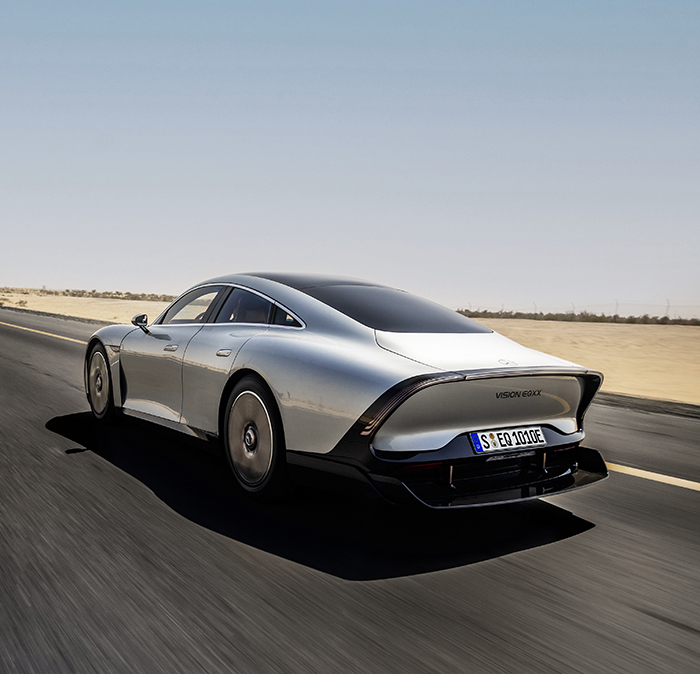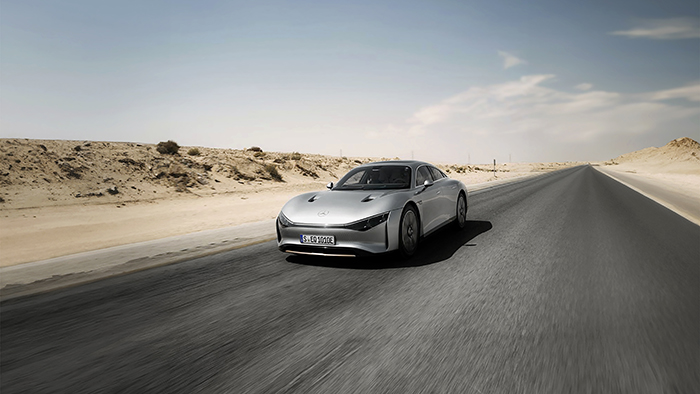On its third long-distance road trip over 1,000+ kilometres, the VISION EQXX technology programme demonstrated that even the Arabian Desert is no obstacle to energy efficiency. On a challenging route profile encompassing busy city streets and open desert, the pioneering test vehicle delivered electric power consumption of 7.4 kWh/100km (8.4 mi/kWh)1. This equates to an equivalent of around 0.9 l/100 km or 282 MPGe for a petrol-fuelled vehicle. In ambient temperatures of up to 34 degrees Celsius (93 degrees Fahrenheit), the VISION EQXX beat its own previous best by a considerable margin.

“With an exceptional consumption of just 7.4 kWh/100 km1, the VISION EQXX continues to provide valuable data for ongoing development of advanced electric efficiency technologies. As expected, all systems performed perfectly in the desert conditions, handling challenges such as road surface finish and temperature as well as dust with ease. Further proof that electric drive is ready for global markets.”
Markus Schäfer, Member of the Board of Management at Mercedes-Benz Group AG, Chief Technology Officer

“Embarking on an electric drive from Riyadh to Dubai isn’t just about reaching a destination; it’s about igniting a transformative journey for the Middle East. The VISION EQXX’s groundbreaking drive from Riyadh to Dubai not only symbolizes our commitment to shaping the future of mobility but also fills me with immense pride that this record was achieved in the region. In navigating this transformative path, we’re setting new benchmarks, reinforcing our technology leadership in electric mobility.”
Michael Stroband, CEO of Mercedes-Benz Cars Middle East.

Third VISION EQXX trip tests efficiency in the Middle East
The starting point for the efficiency drive on the Arabian Peninsula was the Mercedes-Benz Center in Riyadh, Saudi Arabia. The destination was the recently opened Mercedes-Benz Brand Center in Dubai, UAE. The route of 1,010 km (627.6 miles) was completed in a total driving time of 14 hours and 42 minutes. Having left Riyadh at 4:15 a.m. with a full battery, the VISION EQXX still had 309 kilometres (192 miles) of range left when it arrived in Dubai at 7:57 p.m. The route incorporated urban and sub-urban sections in Riyadh and Dubai with heavy traffic as well as lengthy highway sections across the open desert.
Further chance to test technology features such as thermal management and solar roof
The VISION EQXX has twice proven its ability to cover well over 1,000 kilometres on a single charge (Sindelfingen – Cassis and Untertürkheim – Silverstone). The purpose of this third road trip was to maximise efficiency in all areas and examine system performance under extreme desert conditions. Of particular interest in the dry desert heat of up to 34 degrees Celsius was the car’s advanced thermal management. The intelligent on-demand system kept the electric drivetrain and the cabin cool. The air conditioning system was operational during the trip with minimal negative impact on energy efficiency thanks in part to the multi-source heat pump. A further developed version of this heat pump is integrated into the Concept CLA Class unveiled at IAA Mobility 2023. This close-to-production concept previews the model family based on the Mercedes-Benz Modular Architecture (MMA) and benefits from wide-ranging technology transfer from the VISION EQXX.
The relentless desert sun also gave engineers the opportunity to examine closely the performance of the solar roof on the VISION EQXX. The 117 solar cells are used to power many of the ancillaries, reducing the energy drain on the high-voltage system and further improving overall efficiency. On the drive to Dubai, the system harvested 1.8 kWh of solar energy, adding approx. 24 km to overall range. Research continues into the series-production benefits of this technology. Also relevant for comparative analysis with previous test drives were the data gathered on the influence of wind and sun on efficiency. As well as the temperature of the sun, measurements even include the angle and direction of sunlight.
Teamwork between driver and intelligent assistant maximises energy efficiency
One of the most important factors in the efficiency of any vehicle is and remains the person behind the wheel. The driving team on the efficiency trip are highly experienced experts with specific testing tasks. To help maximise energy efficiency, they took full advantage of the car’s intelligent efficiency assistant. It curates a wide range of available information and suggests the most efficient driving style in real time. This includes data such as the direction and intensity of the sun and wind. For instance, during challenging crosswinds along the coast in the UAE, the system helped the drivers adjust their speed accordingly. For maximum solar yield during stops, the team parked the VISION EQXX in alignment with the sun using the solar information display (Tech View).
An important global ambassador for electric mobility that pairs efficiency with luxury
More than two years after it was unveiled, the VISION EQXX remains an eye-catching crowd puller. During that time, it has also covered 23,340 kilometres (14,503 miles) testing its pioneering electric technology under a wide range of demanding real-life conditions. In a region often associated with super sports cars and full-size SUVs, the compact dimensions and sleek proportions of the VISION EQXX drew intense interest. The slippery drag coefficient of just 0.17 pairs with a sophisticated fastback design to represent a highly desirable ambassador for electric mobility. Likewise, with charging infrastructure still sparse in many parts of the world, this was a valuable opportunity to demonstrate long-range electric efficiency under real-life conditions. Another important aspect of the Mercedes-Benz electrification strategy.
In addition to the two previous road trips in Europe, Mercedes-Benz has also taken the VISION EQXX to audiences in the US and China. This has given key global target groups the chance to experience for themselves a realistic, road-going example of luxurious and sustainable electric efficiency.


COMMENTS